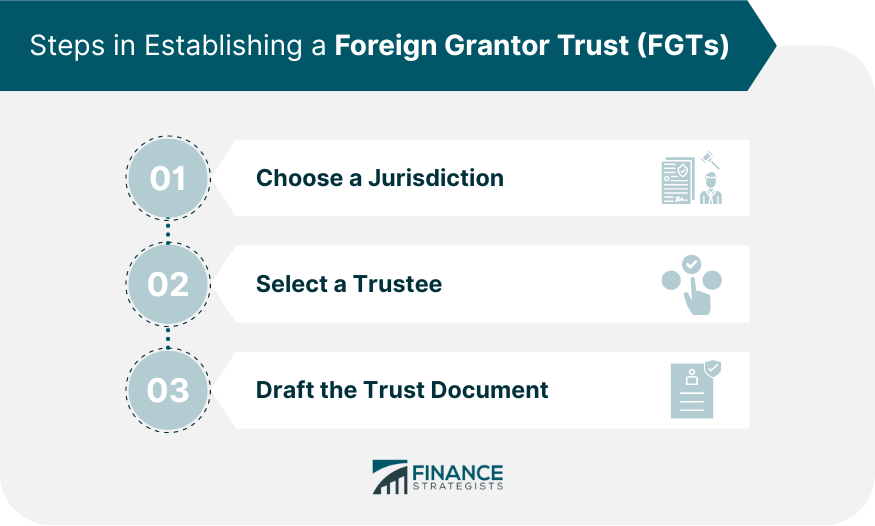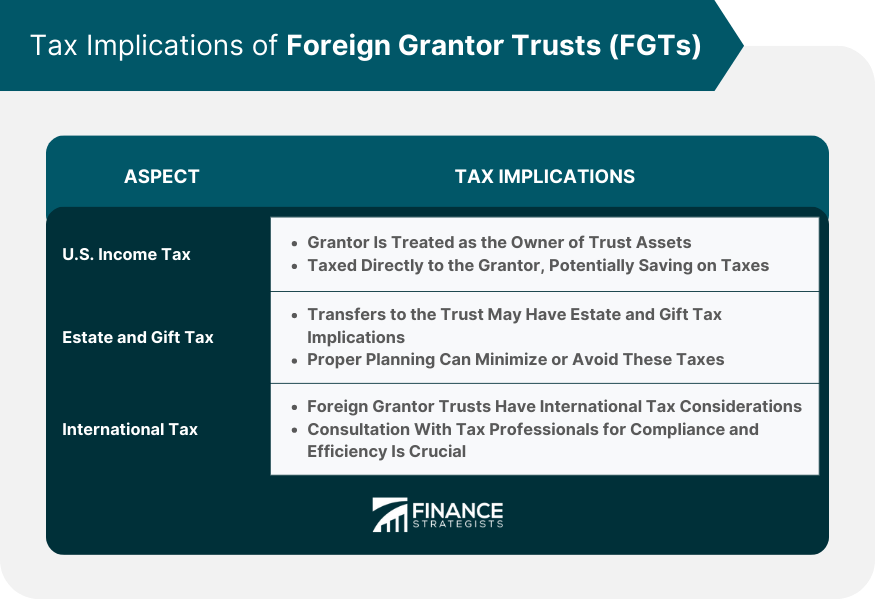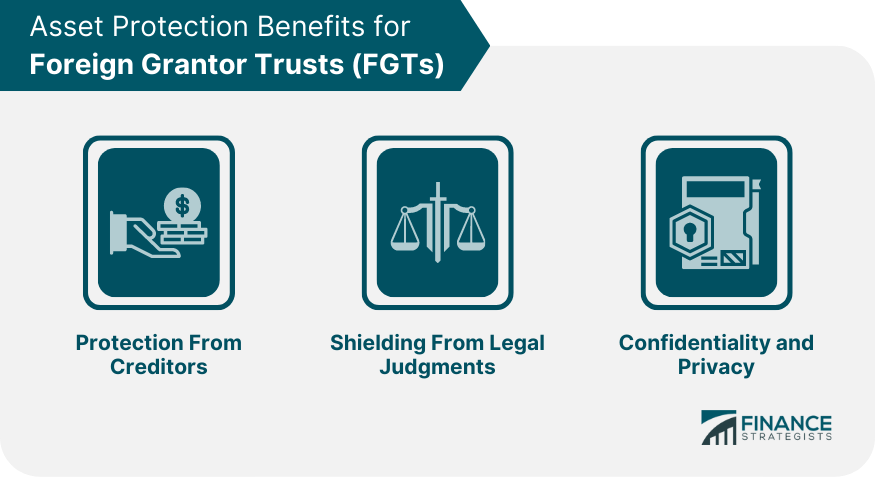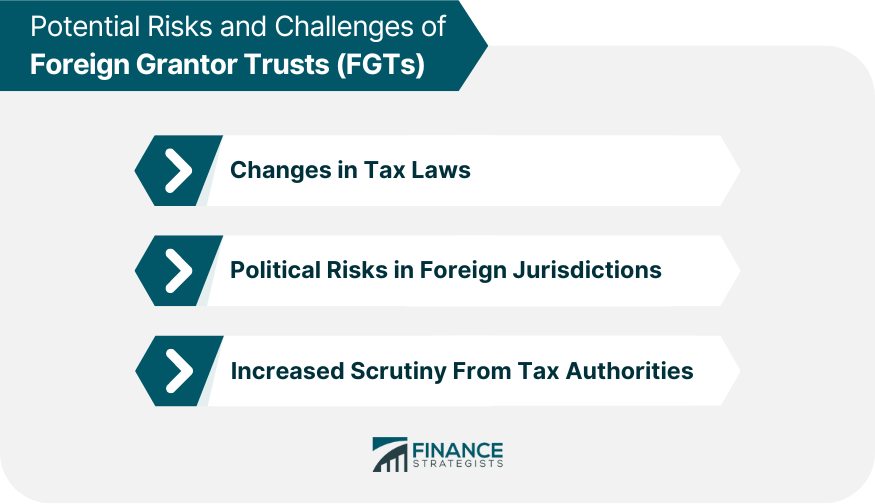Foreign Grantor Trusts are a type of trust established under the laws of a foreign country where the grantor, or creator of the trust, retains certain rights or powers over the trust, such as the power to revoke or amend the trust. These trusts are commonly used in estate planning by individuals who are not residents of the United States but have assets located in the U.S. One of the primary benefits of a Foreign Grantor Trust is that it can provide the grantor with significant tax advantages. Because the grantor is considered the owner of the trust for income tax purposes, the income generated by the trust is typically taxed at the grantor's individual income tax rate, rather than at the potentially higher trust income tax rate. Additionally, assets held in a Foreign Grantor Trusts may be excluded from the grantor's estate for estate tax purposes, potentially reducing the grantor's overall tax liability. One of the first steps in setting up a foreign grantor trust is selecting an appropriate jurisdiction. There are several factors to consider, such as tax benefits and legal protections offered by the jurisdiction. The choice of trustee is crucial, as this individual or institution will be responsible for managing the trust assets and ensuring the trust objectives are met. When selecting a trustee, consider factors such as their experience, reputation, and familiarity with the chosen jurisdiction's laws. The trust document is the legal instrument that establishes the foreign grantor trust and outlines its terms. Key elements of the trust document include dispositive provisions, powers of appointment, and trustee powers. It is essential to work with an experienced attorney to draft a trust document that reflects the grantor's intentions and complies with the applicable laws. Foreign grantor trusts are subject to specific U.S. income tax rules, known as grantor trust rules. Under these rules, the grantor is treated as the owner of the trust assets for income tax purposes, meaning the trust income is taxed directly to the grantor. This can result in significant tax savings compared to non-grantor trusts. Transferring assets to a foreign grantor trust can have estate and gift tax implications. Proper planning can help minimize or avoid these taxes. For example, the grantor may use their lifetime gift tax exemption or annual exclusion when transferring assets to the trust. Foreign grantor trusts may also have international tax implications, such as foreign tax credits and the application of tax treaties. It is essential to consult with tax professionals familiar with both U.S. and foreign tax laws to ensure compliance and maximize tax efficiency. One of the main advantages of foreign grantor trusts is their ability to protect assets from creditors. Trust assets are typically beyond the reach of the grantor's creditors, providing a layer of protection against potential claims. In addition to creditor protection, foreign grantor trusts can also help shield assets from legal judgments. This can be particularly valuable for individuals with a high risk of litigation, such as professionals in certain fields or business owners. Foreign grantor trusts often provide a high level of confidentiality and privacy. Trust documents and related information are typically not public records, which can help protect the grantor's financial privacy. A foreign grantor trust should be integrated into the grantor's overall estate plan. This involves coordinating the foreign trust with other estate planning tools, such as wills, domestic trusts, and powers of attorney. In some cases, a grantor may use a combination of foreign and domestic trusts to meet their estate planning objectives. Proper coordination between these trusts is essential to ensure a seamless and effective overall plan. Succession planning is another important aspect of using foreign grantor trusts in estate planning. This involves appointing successor trustees and beneficiaries, as well as outlining the process for transferring control of the trust upon the grantor's death or incapacity. This can help ensure a smooth transition and continued management of the trust assets according to the grantor's wishes. U.S. taxpayers with interests in foreign grantor trusts must comply with specific IRS disclosure requirements. This includes filing Form 3520 (Annual Return to Report Transactions with Foreign Trusts and Receipt of Certain Foreign Gifts) and Form 3520-A (Annual Information Return of Foreign Trust with a U.S. Owner). Additionally, the grantor may need to file Form 8938 (Statement of Specified Foreign Financial Assets) if the value of their foreign financial assets exceeds certain thresholds. Foreign grantor trusts must also comply with international anti-money laundering regulations. This may include conducting due diligence on the grantor, trustee, and beneficiaries, as well as reporting suspicious transactions to the appropriate authorities. The Foreign Account Tax Compliance Act (FATCA) imposes reporting requirements on foreign financial institutions, including foreign grantor trusts, to identify and disclose information about U.S. account holders. Compliance with FATCA is crucial to avoid potential penalties and maintain the trust's tax benefits. Tax laws, both in the U.S. and the chosen foreign jurisdiction, can change over time. Such changes may impact the tax benefits or reporting requirements associated with foreign grantor trusts. It is essential to stay informed about tax law developments and adjust the trust structure as needed. Political risks, such as changes in government or political unrest, can also impact foreign grantor trusts. To mitigate these risks, it is important to choose a stable jurisdiction with a history of strong legal protections for trusts and a favorable political climate. Foreign grantor trusts may attract increased scrutiny from tax authorities, both domestically and internationally. This underscores the importance of ensuring full compliance with all reporting requirements and maintaining accurate and up-to-date trust records. Foreign grantor trusts provide numerous benefits, including tax efficiency and asset protection. By establishing a foreign grantor trust, the grantor can potentially save on income taxes as they are treated as the owner of the trust assets. Estate and gift tax implications can be minimized through proper planning, and international tax considerations should be carefully addressed to ensure compliance. These trusts offer asset protection by shielding assets from creditors and legal judgments while providing confidentiality and privacy. Planning considerations involve integrating the foreign grantor trust into the overall estate plan, coordinating with domestic trusts, and implementing succession planning. Compliance with IRS disclosure requirements, anti-money laundering regulations, and FATCA is crucial. Risks and challenges, such as changes in tax laws, political risks, and increased scrutiny from tax authorities, must be managed effectively. By understanding and navigating these key points, individuals can harness the benefits of foreign grantor trusts in their estate planning strategies.Definition of Foreign Grantor Trusts
Establishing a Foreign Grantor Trust

Choosing a Jurisdiction
Selecting a Trustee
Drafting the Trust Document
Tax Implications of Foreign Grantor Trusts
U.S. Income Tax Considerations
Estate and Gift Tax Considerations
International Tax Implications

Asset Protection Benefits for Foreign Grantor Trusts
Protection From Creditors
Shielding From Legal Judgments
Confidentiality and Privacy

Planning Considerations for Foreign Grantor Trusts
Integrating With Overall Estate Plan
Coordinating With Domestic Trusts
Succession Planning
Compliance and Reporting Requirements for Foreign Grantor Trusts
IRS Disclosure Requirements
Anti-Money Laundering Regulations
Foreign Account Tax Compliance Act (FATCA)
Potential Risks and Challenges of Foreign Grantor Trusts
Changes in Tax Laws
Political Risks in Foreign Jurisdictions
Increased Scrutiny From Tax Authorities

Bottom Line
Foreign Grantor Trusts FAQs
Foreign grantor trusts offer several benefits in estate planning, including tax efficiency, asset protection from creditors and legal judgments, and confidentiality and privacy. By setting up a foreign grantor trust, individuals can potentially minimize taxes and protect their assets for their beneficiaries.
Foreign grantor trusts are subject to specific U.S. income tax rules, known as grantor trust rules. Under these rules, the grantor is treated as the owner of the trust assets for income tax purposes, and the trust income is taxed directly to the grantor. This can result in significant tax savings compared to non-grantor domestic trusts.
To establish a foreign grantor trust, individuals need to choose a suitable jurisdiction, select a trustee, and draft a trust document that outlines the terms and provisions of the trust. Working with experienced professionals familiar with the chosen jurisdiction's laws is crucial for ensuring the trust is set up correctly and complies with all applicable regulations.
U.S. taxpayers with interests in foreign grantor trusts must comply with specific IRS disclosure requirements, such as filing Forms 3520, 3520-A, and potentially 8938. Additionally, foreign grantor trusts must adhere to international anti-money laundering regulations and the Foreign Account Tax Compliance Act (FATCA) to avoid penalties and maintain tax benefits.
Individuals considering foreign grantor trusts should be aware of potential risks and challenges, including changes in tax laws, political risks in foreign jurisdictions, and increased scrutiny from tax authorities. By staying informed and working with experienced professionals, these risks can be managed, and the benefits of foreign grantor trusts can be maximized.
True Tamplin is a published author, public speaker, CEO of UpDigital, and founder of Finance Strategists.
True is a Certified Educator in Personal Finance (CEPF®), author of The Handy Financial Ratios Guide, a member of the Society for Advancing Business Editing and Writing, contributes to his financial education site, Finance Strategists, and has spoken to various financial communities such as the CFA Institute, as well as university students like his Alma mater, Biola University, where he received a bachelor of science in business and data analytics.
To learn more about True, visit his personal website or view his author profiles on Amazon, Nasdaq and Forbes.















